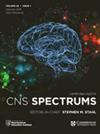精神分裂症患者非物质文化遗产的传承与创新
IF 3.4
3区 医学
Q2 CLINICAL NEUROLOGY
引用次数: 0
摘要
精神分裂症是一种严重的精神疾病,对认知、情感和社会功能产生负面影响。非物质文化遗产作为一种具有文化传承和创新价值的资源,被认为对精神分裂症患者的康复有积极的影响。选取30例精神分裂症患者作为研究对象,随机分为实验组和对照组,每组各15例。实验组采用传承创新数码显示康复治疗,对照组采用常规治疗。治疗后,采用SPSS 23.0软件进行统计分析,比较两组患者的康复情况。结果具体数据显示,实验组的认知功能得分平均提高了25%,情绪状态得分平均提高了18%,社会功能得分平均提高了20%。对照组的改善率分别为13%、10%和12%。实验组与对照组在认知、情感和社会功能方面存在显著差异。结论研究结果表明,数字化展示传承与创新非遗康复治疗相结合,可显著改善精神分裂症患者的认知、情感和社会功能。这种疗法不仅提供了文化传承和创新体验,也为精神疾病患者提供了一种有效的康复手段。然而,需要进一步的研究来验证本研究的结果,并探索更多的细节和机制。辽宁省教育厅科研项目(No.LJKMR20221971);非物质文化遗产保护工程研究的新思路非物质文化遗产保护创新数字展示项目(fy2022002)。本文章由计算机程序翻译,如有差异,请以英文原文为准。
Inheritance and innovation of intangible cultural heritage on patients with schizophrenia
Background Schizophrenia is a serious mental illness that negatively affects cognitive, emotional, and social functioning. As a resource with cultural inheritance and innovation value, intangible cultural heritage is considered to have a positive impact on the rehabilitation of patients with schizophrenia. Subjects and Methods 30 patients with schizophrenia were selected as research subjects and randomly divided into experimental group and control group, with 15 in each group. The experimental group received rehabilitation therapy with digital display of inheritance and innovation, while the control group received conventional treatment. After the treatment, SPSS 23.0 was used for statistical analysis to compare the recovery of the two groups. Results Specific data showed that the experimental group’s cognitive function scores increased by an average of 25%, emotional state scores increased by an average of 18%, and social function scores increased by an average of 20%. The improvement in the control group was 13%, 10% and 12%, respectively. There were significant differences in cognitive, emotional, and social functions between the experimental group and the control group. Conclusions The study results show that the integration of digital display heritage and innovation of intangible cultural heritage rehabilitation therapy can significantly improve the cognitive, emotional, and social functions of schizophrenia patients. This therapy not only provides cultural inheritance and innovative experience, but also provides an effective means of rehabilitation for patients with mental illness. However, further research is needed to validate the results of this study and to explore more details and mechanisms. Acknowledgement Scientific Research Project of the Educational Department of Liaoning Province (No.LJKMR20221971); The Novel Think Tank for the Study of Intangible Cultural Heritage Protection Project; Digital display of intangible cultural heritage preservation and innovation (No.FY2022002).
求助全文
通过发布文献求助,成功后即可免费获取论文全文。
去求助
来源期刊

CNS Spectrums
医学-精神病学
CiteScore
6.20
自引率
6.10%
发文量
239
审稿时长
>12 weeks
期刊介绍:
CNS Spectrums covers all aspects of the clinical neurosciences, neurotherapeutics, and neuropsychopharmacology, particularly those pertinent to the clinician and clinical investigator. The journal features focused, in-depth reviews, perspectives, and original research articles. New therapeutics of all types in psychiatry, mental health, and neurology are emphasized, especially first in man studies, proof of concept studies, and translational basic neuroscience studies. Subject coverage spans the full spectrum of neuropsychiatry, focusing on those crossing traditional boundaries between neurology and psychiatry.
 求助内容:
求助内容: 应助结果提醒方式:
应助结果提醒方式:


